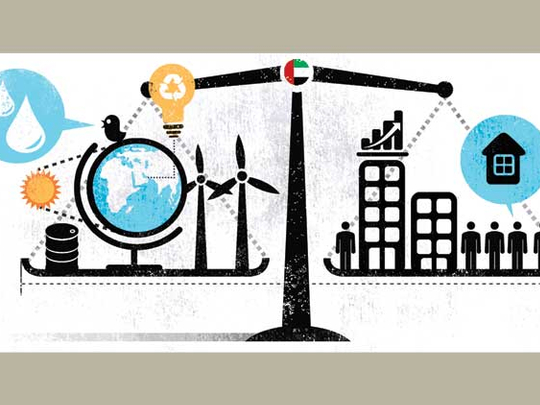
With the world’s population now exceeding seven billion, we enter an age where we must manage our resources more wisely and more sustainably. How we, as a society, can achieve this poses many complicated questions. Can we provide enough water, food and energy to sustain a growing world? Will we be able to grow the economy so we can meet people’s needs for today without compromising the ability of future generations to be healthy and to prosper?
Over the past year, there has been considerable dialogue about “sustainable growth” as the world urbanises at a rapidly increasing rate. Estimates suggest by 2030, as many as five billion people, or 60 per cent of the world’s population, will live in cities. Such a trend will place greater stress on our resources such as land, water, food and energy. Nevertheless, I am confident we can still achieve economic growth sustainably and responsibly. We need, however, to rethink the way we produce and consume, energy, water and food.
With the rising demand for energy across the world, countries must capitalise on all of their energy sources to create more balanced and resilient energy portfolios. We must make conventional sources of energy, such as oil and gas, cleaner and more efficient. Meanwhile, we have to complement these finite supplies with the scaling of renewable energy sources such as solar and wind.
On a planet where only 3 per cent of the world’s water is suitable for humans’ needs, we must consider the research and development of new technologies, such as desalination powered by renewable energy, to ensure plentiful supplies of water so communities can continue to thrive and grow. We are well aware of this in the UAE, where 3 per cent of total electricity in Abu Dhabi alone goes towards desalination — and with water consumption expected to increase at 5 per cent annually, we need solutions other than gas to fuel that new capacity.
With two billion more people set to join us here on Earth by 2050, we need to find new farming methods and food distribution systems, in rural and urban areas, to feed this rapidly growing world. The UAE finds itself in the middle of this conversation: After all, our country imports 85 per cent of its food to meet local demand.
None of the above issues, which together form the water, energy and food security nexus, should be in a silo. They are all intertwined and require new ideas and collaboration from everyone across all segments of society. Furthermore, new innovations can help us address these problems and in turn generate new opportunities for economic growth and employment around the world.
With these aforementioned problems and potential solutions in mind, the UAE is proud to host the Middle East’s largest gathering focused on sustainability issues — Abu Dhabi Sustainability Week (ADSW). Experts and thought leaders in academia, business, government and civil society meet over several days to arrive at solutions to these most pressing economic, environmental and social issues.
At ADSW 2013, we welcomed more than 30,000 participants from 150 countries. In January, we will accommodate even more attendees at ADSW 2014 to expand the debate about how we can continue sustainable development as the world confronts more environmental pressures in the coming decades.
With less than two months to go before ADSW begins on January 18, 2014, expect to hear more about the water, energy and food security nexus, along with additional pressing sustainability issues. We will evaluate the business, technological, financial and social factors in our quest to reach sustainable and responsible solutions that make both environmental and economic sense.
To frame this discussion, I invite you to join us on our journey, ‘The Road to Abu Dhabi Sustainability Week’, here in Gulf News. This weekly column will host political leaders, CEOs of Fortune 500 companies, leading academics and heads of global organisations, who will share various perspectives on what they believe sustainability means and their proposed solutions to building a more secure future.
We selected this cross-section of thinkers because the road to a cleaner, prosperous and more sustainable world requires much effort and thought from leaders from all backgrounds. For example, governments can design regulations and incentives that help the scale of clean technologies such as renewable energy.
The world’s universities offer us the latest in cutting-edge innovations and theories on how we can address a hotter and more crowded world. Businesses are adept at creating market-based solutions crucial for everything from expanding access to clean water to constructing better and more energy-efficient buildings. Civil society can provide environmental and social expertise while ensuring all of these problems will be discussed with the goal of a more inclusive society in mind.
The UAE has accomplished much in economic development, health care and education since we achieved independence just over 40 years ago. ADSW now places our country in a unique position to not only contribute, but to lead the global conversation on sustainability.
I look forward to the thoughts our guest authors will share in this column to provoke more thoughtful conversations related to sustainable development as our important event grows closer and we work together to solve some of the world’s most pressing problems.
Dr Sultan Ahmed Al Jaber is UAE Minister of State and CEO of Masdar, Abu Dhabi’s renewable energy company.








